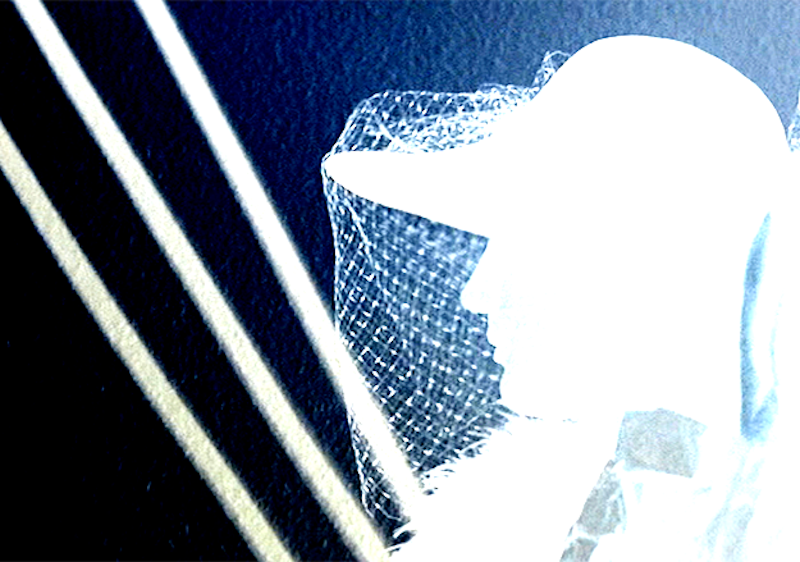There’s yogurt in my hair. I sleep on the floor next to Nancy Pelosi, marveling at how smooth her ancient skin is. Then I wonder if it’s skin at all or some kind of wax foundation with anti-radiation properties.
In the real world, I’m asleep. But there’s an apocalypse in my head: We’re in a northern city, and a missile has hit a bus depot. An occupied bus explodes into the air, looking like a troupe of aerialists on fire. It crashes to the ground in a thousand pieces as people scatter like ants. Protected by the reinforced glass window of our nuke-proof building, I watch this scene as Nancy negotiates on the phone with the enemy. Her aide flings bits of his Chobani at me in a tease. I like it; it’s the foreplay that fuels the adolescent anticipation of sex. Of course, he’s much too young for me, but that’s not a concern because, after all, this is a dream.
In the dark bedroom where I lie dreaming, an a.c. unit in our window grinds out cold air at the expense of my preference for quiet. My husband, also mostly asleep, tries to feel my Janet but the shiny, taut fabric of my lady drawers is in his way. He grabs my kneecap instead. “Ooh baby,” he says.
We’re both dreaming. His is better than mine. Nowadays, mine tend to be torn landscapes of human self-destruction. I’m often simply an observer, witnessing the horrors but shielded by my dream-watcher status. Still, the emotional toll of “seeing” an occupied vehicle blown to bits is real. And I wake up in the vice of terror.
As the Earth’s extreme weather influences our extreme human polarization, my stream-of-consciousness is headed for anxiety. I’m sure I’m not alone and am wondering: are you also tense? Sleeping fitfully? Dreaming in distress? It’s hard to document the existence of a collective, frenetic doom-sight or to pinpoint its origin. Could it exist because of our fast-developing absorption of technology, which is minimizing certain brain activity while maximizing imagination? Think sensory deprivation tank embedded into our heads. Is REM nightmare doom instinctual, driven by the fact that there are too many people on the Earth and, collectively, we’re realizing its consequences and need a pressure gauge?
Early this summer I started seeing a therapist to deal with my dreams. She labeled it 21st-century anxiety disorder. She told me to record them and make a chart of how the things I experience in my day influence my nightly narrative. She also insisted that I limit my screen time—whether phone, laptop or TV. I tried, but screen time is my window on human self-annihilation, and I can’t look away. I’m obsessed with the 21st-century nightmare and all of its phobias. Following each disturbing nocturnal hallucination, I wake up tired, anxious, and stressed from a slew of physiological reactions. And I haven’t just “witnessed” a bus bomb. I’ve seen gun blasts in a classroom. A deer fleeing from the sound of raging chain saws. A fish slowly suffocating in an algae bloom. And a secret agent from Amazon paralyzing me while I sleep, sinking a wire into my ear that plants directives in my brain to order more and more things—is this why I recently bought a pack of LifeStraw personal water filters and a steel ferro rod when I don’t even hike?
My anxiety dreams don’t seem particularly Freudian or Jungian. If they fall anywhere, it’s with neuroscientist and biological realist Antti Revonsuo’s threat simulation theory. He says that the biological function of our dreams is to witness ourselves in threatening events. A catastrophe dream triggers our amygdala’s fight-or-flight reaction, thus giving us a chance to rehearse our means of future survival. All mammals likely have these survival rehearsal dreams, Revonsuo says, and the dreams manifest according to their species’ needs. It’s why a cat’s REM sleep appears to be about hunting.
But what if human behavior is inherently self-destructive? Will our biology allow it?
Recently I read an article from the Endocrine Society that predicts a much-needed 50 percent drop in human population by the end of the century. Not from starvation, or pandemic—although those will likely be a factor—but because increasing stress from anxiety and meaningless interactions is making humans infertile and/or uninterested in having a child. Social withdrawal is on the rise, too, and human sperm counts have fallen some 50 percent in the last 50 years.
Maybe there’s a biology attached to stress-inducing dreams of the apocalypse after all, and maybe we’re collectively having them. I guess that would make me a small part of a vast human shift toward long-term species survival. Our nighttime hallucinations may be ruining us, but they just might save our descendants.

